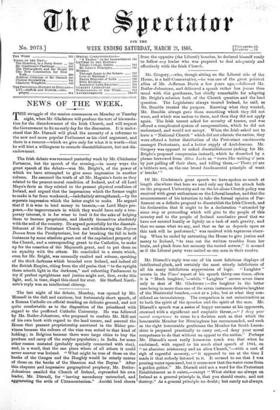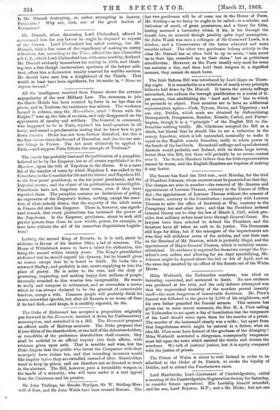Mr. Disraeli's reply was one of his most felicitous displays
of intellectual pluck, and certainly the most utterly infelicitous of all his many infelicitous suppressions of logic. " Laughter " occurs in the Times' report of his speech thirty-one times, often it is " Much laughter,"—while " Laughter " occurs seven times only in that of Mr. Gladstone ; —the laughter in the latter case being in more than one of the seven instances derisive laughter of the Ministerial benches,—not at a joke, but at what they con- sidered an inconsistency. The comparison is not uninstructive as to both the spirit of the speeches and the spirit of the men. Mr. Disraeli's speech was series of happy sarcasms at his opponents, crowned with a significant and emphatic threat,—" I deny your moral competence to come to a decision such as that which the honourable Member for Birmingham has recommended, and such as the right honourable gentleman the Member for South Lanca- shire is prepared practically to carry out,—I deny your moral competence to do that without an appeal to the nation." Perhaps Mr. Disraeli's most really humorous touch was that when he exclaimed, with regard to his much cited speech of 1844, on " an absentee aristocracy and an alien Church,"—with a sort of sigh of regretful memory, —" it appeared to me at the time I made it that nobody listened to it. It seemed to me that I was pouring water upon sand, but it seems now that the water came from a golden goblet." Mr. Disraeli said not a word for the Protestant Establishment as it exists,—except " What strikes me always on Ireland as a general principle is, that you should create, and not destroy." As a general principle no doubt ; but surely not always.
Is Mr. Disraeli destroying, or, rather attempting to destroy, Feniauism ? Why not, then, one of the great feeders of Fenianism ?































 Previous page
Previous page